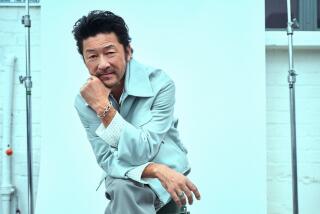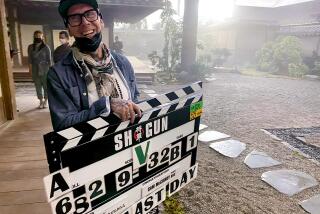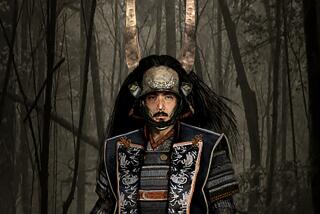‘Seven Samurai’ excels in the hands of a master
- Share via
Seven Samurai
(Criterion Collection, $50)
THE story is simple -- poor villagers living in the countryside in 16th century Japan hire a group of warriors to protect them from invading bandits intent on robbing them of their barley crop. But Akira Kurosawa’s telling of the tale is masterly. All the elements aligned to make “Samurai” a flawless piece of cinema -- the direction, screenplay, performance, music score, cinematography and production design are beyond reproach. And even at 3 hours and 27 minutes, this 1954 epic, which was westernized in 1960 as “The Magnificent Seven,” moves at a breakneck pace.
Though he had had samurai characters in previous films, including “Rashomon,” this marked the first time Kuroswa made a true samurai picture. Besides incredible action sequences -- the climactic fight sequence in a torrential downpour and knee-deep mud is brilliantly staged -- Kurosawa never scrimps on character development.
Several veteran Kurosawa actors star: Toshiro Mifune is superb as the wisecracking, unruly warrior Kikuchiyo, and Takashi Shimura is equally effective as the wise, level-headed leader of the warriors, Kambei.
Written by Kurosawa, Shinobu Hashimoto and Hideo Oguni, the film boasts the talents of composer Fumio Hayasaka and cinematographer Asaichi Nakai.
Criterion has handled this film with the care it deserves -- “Seven Samurai” looks and sounds as if it were made last week.
Because the original negative no longer exists, a duplicate negative was created from original material. Several digital hardware and software solutions were used to correct instability and reduce dirt and scratches. A new 4.0 mix was created from the original optical recordings, stereo music masters and production sound effects masters. The original monaural soundtrack was mastered from an optical soundtrack print. Audio restoration tools reduced clicks, pops, hissing and crackles.
Extras: The three-disc set includes two historical, scholarly commentaries, one with film scholars David Desser, Joan Mellen, Stephen Prince, Tony Rayns and Donald Richie, the other a vintage track with Japanese-film expert Michael Jeck; a 50-minute documentary on the making of the film that was part of a Japanese TV series, “Akira Kurosawa: It Is Wonderful to Create”; “My Life in Cinema,” a fascinating two-hour conversation between Kurosawa and Nagisa Oshima; “Seven Samurai: Origins and Influences,” a fact-filled documentary examining the traditions of the samurai as well as the films and filmmakers influenced by this movie; trailers and teasers; and galleries of rare posters, production stills and behind-the-scenes photos.
-- Susan King
More to Read
Only good movies
Get the Indie Focus newsletter, Mark Olsen's weekly guide to the world of cinema.
You may occasionally receive promotional content from the Los Angeles Times.











